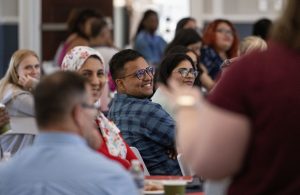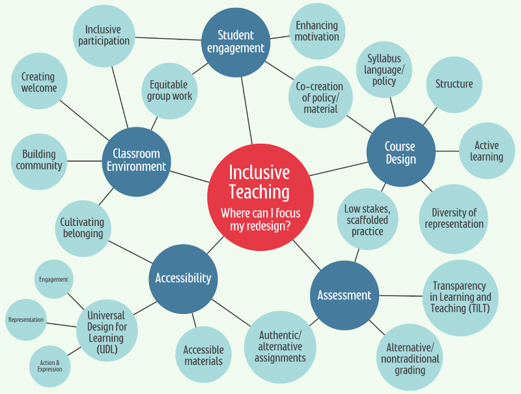by Derek Bruff, visiting associate director
Last spring I hosted a faculty learning community for CETL on the subject of active learning instruction in large STEM courses. We had about a dozen faculty from various departments who met every other week, mostly on Zoom, to share and discuss shared challenges teaching large coursse. We also read and discussed a selection of STEM education research articles, and you can view our reading list in a previous CETL blog post.
This fall, as the CETL liaison to the STEM departments on campus, I wanted to build on the spring learning community by involving more faculty in important discussions about STEM teaching. A second goal for the fall was to raise awareness about the many STEM teaching initiatives around campus, ones I had been learning about as I did my listening tour of STEM departments.
With those goals in mind, CETL launched a series of STEM teaching lunches this fall. Each event in this series features a different set of panelists doing interesting things in STEM teaching at the University of Mississippi, and each event is in person with lunch provided by CETL. We’ve had two lunches so far, with a third on coming up on November 10th, and the participation and discussion in the series has been fantastic.
September 22nd – Supplemental Instruction
The first lunch on September 22nd focused on the Supplemental Instruction (SI) program that is run by CETL’s program manager Hannah Margaret Glass. Panelists included two faculty members involved in SI, Emily Rowland from chemistry and Jenny Meyer from physics, as well as three experienced undergraduate SI leaders: Abigayle Taylor, Reid Bain, and Kaleb Henry. They all spoke to the goals of the SI program, the benefits they see from the program in STEM courses, and some of the challenges they encounter in their various roles.
What is Supplemental Instruction? SI recruits undergraduate students who have done well in historically difficult courses to serve as, well, supplemental instructors for those courses. These SI leaders offer weekly support sessions for students in those courses that go beyond mere tutoring. The SI leaders plan problem-focused activities for the sessions that engage students, reinforce learning, and support students around the hardest topics.
The SI leaders at the September 22nd lunch spoke compellingly about the value of SI to the students who attend their sessions. Not only do these students get the help they need learning the course material, but they also develop relationships with the SI leaders and each other. These relationships are important for students struggling through a hard course to persist in that struggle, and all three SI leaders talked about how rewarding it was to motivate and cheer on students in this way.
The faculty panelists also spoke to the value of SI for their students, particularly the students who start attending the sessions well before the first exam. Sure, there’s value in showing up to an SI review session right before an exam, but the students who attend regularly get the additional time on task (with support) they need to master the course material. The faculty also mentioned how rewarding it was to reach out to a student who had done well in a course to invite them to be a future SI leader.
You can read more about the Supplemental Instruction program on our website, and if you’re interested in adding SI to your courses, please reach out to SI program manager Hannah Margaret Glass at hmglass@olemiss.edu.
October 3rd – Alterative Grading Practices
The second STEM teaching lunch on October 3rd featured a conversation with Eden Tanner, assistant professor of chemistry and biochemistry, about her recent experiments with mastery assessment. In a nutshell, the students in her 170-seat general chemistry course can retake a new version of each of the four exams in the course basically as many times as they want. When she first tried this new approach in the spring semester, she saw dramatic improvements in her students’ scores on the final exam, a nationally standardized exam from the American Chemical Society.
How did Eden manage so many exam retakes in such a large class? That was the hot question during the discussion, which spent a lot of time on the logistics of this mastery assessment strategy. I won’t say anything more about Eden’s presentation here on the blog because I recently interviewed her for my Intentional Teaching podcast. In that interview, we talk about her motivations from moving away from traditional grading practices as well as, yes, all the nuts and bolts about her retake policy.
November 10th – Student Belonging in STEM
Our third and final STEM teaching lunch this fall is coming up on November 10th from 12pm to 1pm in the Johnson Commons East Banquet Room. We’ll focus on the topic of student belonging in STEM courses and majors at the University of Mississippi. I’m very excited to have a panel of faculty and staff involved in a Howard Hughes Medical Institute grant aimed at understanding, promoting, and evaluating inclusivity in STEM education. Grant team members Jessica Osborne (Center for Research Evaluation), Susan Pedigo (chemistry), and Rebecca Symula (biology) will share and discuss some of their initial research on student and faculty perspectives on belonging and inclusivity.
If you’re involved in STEM teaching at Mississippi and would like to join us for the November 10th session, please register here so we can have a lunch waiting for you! And keep an eye out for CETL communications about more STEM teaching lunches this spring.


